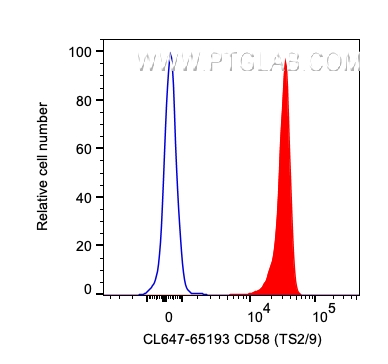验证数据展示
经过测试的应用
| Positive FC detected in | human PBMCs |
For other applications, we recommend the unconjugated version of this antibody, 65193-1-Ig
推荐稀释比
| 应用 | 推荐稀释比 |
|---|---|
| This reagent has been pre-titrated and tested for flow cytometric analysis. The suggested use of this reagent is 5 µl per 10^6 cells in a 100 µl suspension or 5 µl per 100 µl of whole blood. | |
| Sample-dependent, Check data in validation data gallery. | |
产品信息
CL647-65193 targets CD58 in FC applications and shows reactivity with Human samples.
| 经测试应用 | FC Application Description |
| 经测试反应性 | Human |
| 免疫原 | Human cytolytic T cells 种属同源性预测 |
| 宿主/亚型 | Mouse / IgG1, kappa |
| 抗体类别 | Monoclonal |
| 产品类型 | Antibody |
| 全称 | CD58 molecule |
| 别名 | Ag3, CD58, CD58 molecule, FLJ23181, FLJ43722, LFA 3, LFA3, Surface glycoprotein LFA 3 |
| 计算分子量 | 28 kDa |
| GenBank蛋白编号 | BC005930 |
| 基因名称 | CD58 |
| Gene ID (NCBI) | 965 |
| RRID | AB_2935004 |
| 偶联类型 | CoraLite® Plus 647 Fluorescent Dye |
| 最大激发/发射波长 | 654 nm / 674 nm |
| 形式 | Liquid |
| 纯化方式 | Protein G purification |
| UNIPROT ID | P19256 |
| 储存缓冲液 | PBS with 0.1% sodium azide and 0.5% BSA, pH 7.3. |
| 储存条件 | Store at 2-8°C. Avoid exposure to light. Stable for one year after shipment. |
背景介绍
CD58, also known as lymphocyte function-associated antigen 3 (LFA-3), is a heavily glycosylated protein of 55-70 kDa that is expressed on a broad range of hematopoietic and non-hematopoietic cells. CD58 is involved in immune recognition of tumor cells via binding of the CD2 receptor expressed on cytotoxic T cells.
实验方案
| Product Specific Protocols | |
|---|---|
| FC protocol for CL Plus 647 CD58 antibody CL647-65193 | Download protocol |
| Standard Protocols | |
|---|---|
| Click here to view our Standard Protocols |
